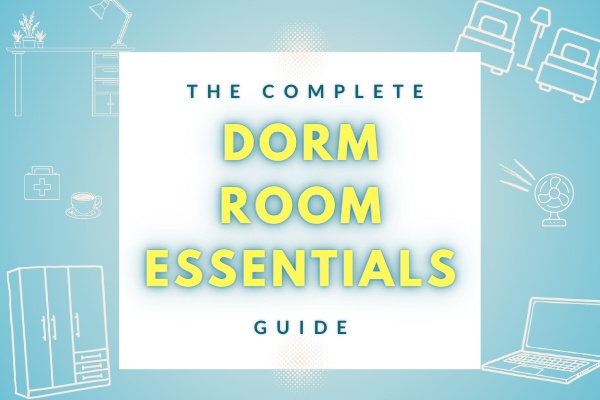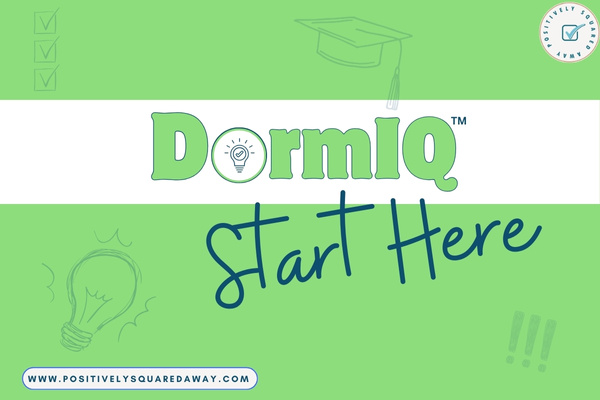As our teens prepare to leave the nest for college, it really is up to us, their wonderful life experienced parents, to ensure they have the essential life skills that are just not taught in traditional academic curriculum. So let’s rally around our kids and work on this list to help our kiddos prepare to head into adulthood.
Introduction
Preparing your high schooler for the leap into college and adulthood is about more than just academic readiness. It’s about equipping them with a toolkit of life skills that will serve them well beyond their school years. Accountability, respect, planning, budgeting, household management, safety, well-being…these are all factors in becoming responsible adults.
The days of Home Economics and Shop classes have been replaced with AP classes and career pathways in high school, so we really wanted this to a be comprehensive guide for parents to be able to teach those important life skills. We spoke with many parents, students and young adults to compile this list. There is a lot here, and it won’t all necessarily be relevant for you or your student, but most will! I recommend to pick a couple per week and try to knock out as many as possible before they head to their adulting adventures be that college or other avenues.
This list below details 56 essential skills across various categories and each includes a suggestion for how to teach that lesson along with additional considerations for teaching, exploring and experiencing these life skills for teens.
While it is a roller coaster of emotions to watch our kids prepare to launch, knowing that they are prepared for the challenges of adult life will make this leap a little easier on both of you. ❤️
Financial and Economic Life Skills For Teens
Managing Money, Budgeting, and Investments
- Budgeting Basics
- Importance: Teaches financial responsibility, planning and living within one’s means.
- How to Teach: Start with a simple weekly or monthly budget using a spreadsheet or budgeting app.
- Consider: Have your student present their budget to you on a regular (perhaps monthly) basis so that you can discuss trends, surprises and the importance of an emergency fund.
- Savings Strategies
- Importance: Saving money is crucial for future financial security, emergency funds, and achieving long-term goals.
- How to Teach: Encourage setting aside a portion of any money they receive (allowance, gifts, earnings) into a savings account. Discuss setting savings goals for higher education, larger purchases and future needs.
- Consider: Read about Roth IRAs in #10 below. Anyone, regardless of age, can open one if they have earned income.
- Banking Skills
- Importance: Understanding banking is key to managing personal finances, including saving, withdrawing, and transferring money.
- How to Teach: Work together to research the best checking account for students. Help them open a checking account and teach them how to use an ATM, how to write checks, and monitor their account online. Be sure to warn about the stiff penalties for over-drafting the account and the importance of keeping their account information and bank card secure.
- Consider: If your student has college plans, look for a bank with branches near your home as well as near their colleges of interest if possible. While most banking happens online, sometimes you just need to go into a bank for a service or assistance.
- Smart Shopping
- Importance: Educated shopping helps control spending, aids in finding good deals, and to avoid impulse buys.
- How to Teach: Show them how to compare prices, look for discounts and sales, and make shopping lists to avoid unnecessary purchases. Discuss how seasonality can impact pricing. For example, shopping early for a dorm room is recommended rather than wait until late summer when inventory is low and demand is high.
- Consider: Ever since my kids could find things they wanted to buy online, I’ve showed them how to shop that item across all retailers as well as how to look for discount codes. If they found something they “needed” and they could find a great deal, we’d sit and purchase the item together, and then I’d send them the shipping info so they could track their purchase. This will also eliminate the endless “Mom, when are my shoes going to get here” questions!
- Credit Card Management
- Importance: Proper credit card use is essential to avoid debt and build a good credit history. While it would be easier to delay credit card usage, some purchases are only possible with a credit card.
- How to Teach: Start with a prepaid, secured or low-limit credit card. Teach them to pay off the balance in full each month and monitor their spending closely.
- Consider: If your student does not already have a credit card in their name, consider either adding a new card to your account in their name OR opening a student credit card such as the popular Discover Student or a Capital One Student credit cards.
- Understanding Loans
- Importance: Essential for managing student loans and taking on too much debt.
- How to Teach: Discuss different types of loans and interest rates. Use an online calculator to understand how payments are calculated, amortization statements and total interest paid over the life of a loan.
- Consider: Go to a CarMax (or similar) to look at the price of cars or look through used cars online (I prefer in person for this to make those prices sink in). Then enter the purchase price for a car they like into a car loan calculator and look at monthly payments along with total interest paid over the life of the loan.
- Understanding Credit Scores
- Importance: A good credit score is crucial for obtaining loans, credit cards, leasing an apartment and employment opportunities. A lower rating may also cause increased costs in utilities, loan rates and interest rates.
- How to Teach: Explain how credit scores are calculated, the importance of paying bills on time, and how to check their credit report regularly for accuracy. Credit repair is a lengthy tedious process that is better avoided by keeping a clean credit record.
- Consider: Look up their credit report and consider putting a freeze on theirs so that it cannot be used fraudenlently. We keep ours and our kids’ frozen at all times and only unfreeze for a couple of days if credit access is needed for a purchase or verification.
- Understanding Insurance
- Importance: Insurance is a critical component of financial planning and protecting against unexpected events.
- How to Teach: Discuss different types of insurance (health, auto, renters) and why each is important. Review insurance policies together to understand coverage and premiums. Be sure to reiterate how their driving record is directly related to their insurance premiums (and yours for now if you are still paying their auto insurance). If they will stay on your health insurance after high school, contact your insurance company to request a card for them to carry in their wallet.
- Consider: Use an insurance aggregator website to ‘shop’ for a new auto insurance policy and compare pricing to coverage amounts and options.
- Understanding Taxes
- Importance: Knowing how to manage and file taxes is essential for compliance and maximizing deductions.
- How to Teach: Involve them in the process of preparing your own taxes, or guide them through filing their first tax return, possibly with the help of an online tax preparation site such as TurboTax. Discuss the difference between federal, state and local taxes.
- Consider: Print out a W4 form and walk them through how to complete it before they are faced with one at a job. Instill the confidence now to know exactly how to complete this document.
- Financial Planning for the Future
- Importance: Early financial planning is essential for long-term goals like retirement, buying a house, or starting a business.
- How to Teach: Introduce basic concepts of investment, such as stocks, bonds, and retirement accounts and reiterate the importance of saving a small portion of every paycheck. Encourage them to think about and plan for their long-term financial future.
- Consider: If the student has any earned income from a job, help them to open a Roth IRA and save a small amount each paycheck into this IRA. Even the smallest amount saved now will be significant in the future and also helps to show them the benefit of starting early.
- Planning For Difficult Situations
- Importance: Should you become incapacitated or worse, be sure all of your accounts have a beneficiary named.
- How to Teach: Talk to your student about beneficiaries on your accounts and the importance of designating how your assets should be handled if necessary.
- Consider: For students who have reached adulthood (18 years old in most states), a Financial (or Durable) Power Of Attorney is a smart idea.
Safety and Emergency Skills For Teens
Personal Safety, Emergency Preparedness, and Basic First Aid
- Personal Safety Awareness
- Importance: Crucial for staying safe in various environments, especially when alone.
- How to Teach: Discuss situational awareness, personal boundaries, and safety strategies in different settings (like at night or in unfamiliar areas). If your student is college bound, we do a deeper dive on campus safety in this article.
- Consider: Personal safety devices such as the Birdie Personal Alarm. If you’re considering pepper spray, check to see if it is allowed on your college campus, and also know that it can only fly as checked luggage on an airplane (not in a carry on).
- Setup Ride Share Accounts
- Importance: Never have a reason to ride with a potentially impaired driver.
- How to Teach: Have your student install the Uber or Lyft apps, or both. Help them setup their account to protect their privacy and turn on settings to assist with safety.
- Consider: For younger students without many incoming funds, put your credit card on their account so that they can always make the safe choice if faced with a difficult situation. We don’t want them to make bad choices because of finances.
- Power Outage Planning
- Importance: It may seem minor, but planning ahead can make a big difference for both comfort and safety during an extended power outage.
- How to Teach: When storms are in the forecast, be sure all chargeable devices are fully charged including laptops, portable phone charging blocks and the portable jump start battery in your car if you have one. Gather candles, lighters and flashlights. Let your loved ones know your whereabouts. Park cars away from trees, under cover if possible. I like to empty the ice trays into large baggies to allow the ice maker to create additional ice. Have a cooler ready if you lose power for an extended time and use those bags of ice to help keep it cold.
- Consider: A smart idea no matter where you live is to put a small paper cup full of water in the freezer. Once the water is frozen, lay a nickel on top. If you are away from home for an extended time and wonder if you lost power, check that cup. If the nickel is at the bottom of the cup, you lost power and probably need to discard the contents of the fridge and freezer.
- Emergency Preparedness
- Importance: Essential for responding effectively in unexpected situations like natural disasters.
- How to Teach: Create an emergency plan together, discussing what to do in case of different types of emergencies. Ensure they know where emergency supplies are kept at home.
- Consider: If your student is moving to an apartment, it is likely not equipped with a fire extinguisher. Be sure to check that upon move-in and if not, pick one up to keep under the kitchen sink or in the laundry room. Also check for a carbon monoxide detector. If there is not one installed in the apartment, I recommend this carbon monoxide detector with the digital readout and battery backup. I also recommend these for dorms as there have been recent issues with detectors malfunctioning or not being installed at all.
- Navigating Emergency Healthcare
- Importance: To know when it is appropriate for you or someone you to seek Urgent care vs Emergency Room care.
- How to Teach: Guide them through the process of making doctor’s appointments, filling prescriptions, and understanding health insurance basics.
- Consider: You’ve probably already faced some privacy restrictions with your child’s healthcare as they reached the teen years. Once they turn 18, healthcare providers are not permitted to talk to parents without the young adult’s permission. Should your young adult be unable to give that permission, a healthcare power of attorney will allow providers to discuss details with you and allow you to make decisions. This is similar to what we put in place with our aging parents and just as important with our young adults!
- Travel Planning and Safety
- Importance: Ensures safe and well-organized trips, whether for leisure or work.
- How to Teach: Plan a trip together, discussing aspects like budgeting, booking accommodations, and researching travel safety tips for specific destinations. Look at applying for a passport if the student doesn’t already have one and know that if they got their passport at age 16 or younger, it is only valid for 5 years rather than the 10 years for those over 16. Also be aware that some countries require remaining passport validity of 3-6 months to allow you into their country. All good things to know in case of traveling abroad for school, spring break or other opportunities.
- Online Safety
- Importance: Protects against cyber threats, scams and personal information.
- How to Teach: Educate students about secure passwords, recognizing phishing attempts, and safe browsing practices. Discuss the importance of protecting personal information online.
- Consider: With the advent of Artificial Intelligence (AI), scammers are becoming even more sophisticated and pulling off scams using samples of a students’ voice to call their parents and declare that they’re in trouble and need money. This has fooled many parents. Discuss these potential situations with your student and how you will respond should either of you receive a call like this. Be sure that his includes trying to reach each other directly as your student may just be unknowingly studying in their dorm room while a scammer has you in a panic.
Life Management Skills For Teens
Navigating Adult Life, Legal Awareness, and Independence
- Self-Advocacy
- Importance: Essential for expressing personal needs and rights, especially in workplace, educational or healthcare settings.
- How to Teach: Encourage them to speak up for themselves or others in relevant situations. Advocation does not need to be confrontational, in fact, it should be handled in a fact-based even-natured manner.
- Consider: As self-advocacy is often easier with the facts on hand, encourage the student to think of situations where it might necessary and how they can proactively prepare. An simple example may be a student not getting the playing time they believe they have earned. A way to proactively prepare would be to gather game statistics and document their dedication with a calendar showing that they never missed a practice. Thinking about these situations in advance make it much easier to be proactive.
- Basic Car Care and Maintenance
- Importance: Important for vehicle safety and to prevent costly repairs.
- How to Teach: Show them basic maintenance tasks such as checking oil levels, tire pressure, and filling and changing a tire. Also discuss the importance of watching for recalls and knowing what all of the gauges measure in the car they drive.
- Consider: Our family keeps a portable jump start charging block in each of our cars – these can be a lifesaver if your car won’t start, and you are alone. These blocks come with jumper cables, so a demonstration of how to attach jumper cables would be a good idea.
- Public Transportation Navigation
- Importance: Enables independence and confidence in navigating urban environments at home and in other cities.
- How to Teach: Take trips together using public transportation, showing how to plan routes, change trains, find schedules, and purchase tickets on site and via an app.
- Understanding Leases and Utilities
- Importance: Important for independence and navigating adult responsibilities like leasing agreements, deposits and home maintenance.
- How to Teach: Discuss topics like lease agreements, tenant rights, budgeting for rent and utilities, roommate considerations and basic home upkeep responsibilities.
- Legal Awareness
- Importance: Helps in understanding rights and responsibilities as a citizen and to always respect law enforcement.
- How to Teach: Discuss basic legal concepts relevant to their age, such as contracts, consent, inappropriate photos/video, minor in possession, traffic stops and rights when interacting with law enforcement.
- Consider: Search for civics and legal videos for teens provided by your state. YouTube would be a good place to look for this content.
- Voting and Political Awareness
- Importance: Encourages civic engagement and informed participation in the democratic process.
- How to Teach: Discuss the importance of voting and staying informed about political issues. Guide them through the process of registering to vote and researching candidates and issues.
- Consider: Take your 18 year old to the first state or federal election and answer any questions they have about the process.
- Pet Care
- Importance: Instills responsibility and compassion, and teaches the importance of caring for another living being.
- How to Teach: Involve them in the daily care of a family pet, including feeding, grooming, and regular veterinary visits.
- Consider: Assign them with a regular daily task for the care of the pet. There seems to be a growing trend of college students adopting pets who often end up back with their parents once they realize the amount of work required. Helping them understand this before college may help them look at pet adoption with a better understanding of what is involved.
Household and Practical LIFE Skills for teens
Everyday Tasks and Basic Home Management
- Meal Planning and Grocery Shopping
- Importance: Planning ahead encourages both healthy eating habits and budget management.
- How to Teach: Involve them in weekly meal planning, making grocery lists, and shopping together. Teach them to read labels and compare prices.
- Consider: Have them shop the same 10 common grocery items in store, in that stores’ online pickup or delivery shopping app and in Instacart to compare prices. It is important to understand that online pricing is frequently higher than in store.
- Basic Cooking Skills
- Importance: Essential for self-sufficiency and healthy living. Reduce the “I’ll just go through a drive-through” attitude.
- How to Teach: Start with simple recipes and gradually introduce more complex dishes. Cooking together can be a fun and educational activity.
- Consider: Work up to your teen ultimately shopping for and preparing a meal for the family. Perhaps start with something like The Healthy College Cookbook and work together to create the first few recipes.
- Nutritional Knowledge
- Importance: Understanding nutrition is crucial to maintaining a healthy lifestyle and making good food choices.
- How to Teach: Discuss the basics of a balanced diet, the importance of different nutrients, and how to make healthy choices mixed in with occasional splurges.
- Consider: Pull up the nutrition information for their favorite fast food meal and then compare that to a similar meal made at home using a recipe and ingredients from the grocery store. I think they’ll be surprised at not only the fat, sugar, calories but also at the long list of mystery ingredients.
- Laundry Skills
- Importance: At some point, everyone has to do their own laundry!
- How to Teach: Better to get them started long before they launch so that they’ll have it down when they’re on their own. Show them how to sort laundry, choose the right wash settings, treat stains and properly fold and store clothes. If they’re headed to college, talk about the best settings to choose when you only have one or two cycles and maybe three temperature options. Those commercial machines are pretty rudimentary (and can be rough on clothes).
- Housekeeping Skills
- Importance: Keeps living spaces clean, organized, and comfortable.
- How to Teach: Create a cleaning schedule and involve them in regular household chores like dusting, vacuuming, cleaning their bathroom and helping clean the kitchen. Also include less frequent tasks such as taking out the trash, going through their closet to set aside old clothes and shoes for donation, washing cars inside and out, helping clean out and reorganize the garage, etc.
- Basic Home Repairs
- Importance: Develop the ability and confidence to fix minor issues quickly and without extra cost.
- How to Teach: Start with basic tasks like unclogging a drain or changing a lightbulb, then gradually introduce more complex repairs.
- Consider: Many parents send a small toolkit as part of their student’s dorm supplies. Students will have occasions to need a hammer, screwdriver, measuring tape and more in a dorm. Things fall off the walls, drawer knobs loosen, closet door jambs get out of alignment, it all happens. You might get the toolkit a year or so before heading to a dorm and let them break it out when minor household repairs are needed to get used to using the tools that will be heading to college.
- Sustainable Living Practices
- Importance: Helps in reducing environmental impact and enforcing the reduce, reuse, recycle mentality.
- How to Teach: Implement practices at home like recycling, reducing waste, conserving water, and reducing energy consumption at home. Discuss the impact of these actions on the environment.
- Consider: Invest in a water filtration pitcher such as a Brita at home and replace disposable water bottle purchases. Disposable water bottles are incredibly difficult in a dorm for one. Getting to a store, lugging them back to your dorm and then finding space to store them is inconvenient at best. Taking a few refillable water bottles and an inexpensive pitcher is a much better plan environmentally, economically and hassle-wise. Show them how to change the filter in the pitcher after about 2 months as well.
- Basic Sewing
- Importance: A missing button can mean a favorite garment sits unworn for months or until mom is available to fix it.
- How to Teach: Teaching our kids how to sew a button back onto their favorite pants or shirt can actually make a big difference. Show them how, then put a small sewing kit in with their first aid kit when it is time to head to college.
Educational and Communication Life Skills For Teens
Study Techniques, Research, and Critical Thinking
- Time Management
- Importance: Develops efficient use of time which in turn reduces stress and helps in meeting deadlines.
- How to Teach: Introduce tools like planners or digital calendars. Help them create a daily or weekly schedule and a plan for balancing academics, extracurriculars, and fun.
- Consider: Have them keep a log for one week of how they spend their time. At the end of the week, sit together and review how much time is spent doing things with little to no value (eg social media scrolling!).
- Effective Study Techniques
- Importance: Improves learning and academic performance.
- How to Teach: Explore different studying methods (flashcards, Quizlets, summarization, rewriting notes, group study sessions) and help them discover what works best for their learning style.
- Consider: You may think this would already be developed in the high school years, but there are growing numbers of college freshman struggling with basic study skills especially since the pandemic. Practicing more rigorous study skills in high school can only help with college academics.
- Research Skills
- Importance: Vital for academic success as well as informed decision-making important for daily life and most careers.
- How to Teach: Guide them in using trustworthy online resources, evaluating sources for credibility, and organizing information effectively.
- Consider: Choosing a college is a wonderful way to practice researching. Dive deep into college websites to collect data on majors, tuition, scholarships, application dates and requirements, common data sets, tour options, etc. Add in 3rd party reviews and community feedback and collect and compare of all of this data in a spreadsheet. What a great exercise in researching, collecting data and making informed decisions.
- Public Speaking
- Importance: Builds confidence for effective communication in both academic and professional settings.
- How to Teach: This is a tough one to teach in the comfort of home, but look for opportunities outside of the home for public speaking. Leadership roles in high school or community organizations, church functions, sports banquets, volunteer organization events, even theatre and performing arts lend confidence to public interactions and speaking.
Health and Well-being For Teens
Physical, Mental, and Emotional Health
- Staying Hydrated
- Importance: Good hydration is essential for a healthy and productive lifestyle.
- How to Teach: In this word of sports drinks, sodas and Starbucks, it is really important to teach our kids to drink WATER. Teens need 7-10 cups of water per day, so help them incorporate water into their daily routine. A glass when they wakeup, water with meals and water to sip on during the day. This is especially important for active teens and student athletes – they will need more than the 7-10 cups per day.
- Consider: Teens today love their water bottles, the Stanley craze is real! Have them select a personal water bottle or two to encourage them to drink more water. Simple lids with wide tops are the easiest to clean.
- Personal Health Management
- Importance: Ensures overall well-being and independence in handling health issues.
- How to Teach: Educate them about the types of doctors and health care, when to schedule regular check-ups, and the importance of listening to their body. Also discuss healthcare insurance, what your plan covers and how to determine what is covered prior to a visit.
- Consider: Once they are old enough to drive, they are probably old enough to call and schedule doctor and dentist appointments. Utilize a shared digital family calendar to track appointments and follow-ups and order them their own health and dental insurance cards to carry in their wallets.
- First Aid Basics
- Importance: Prepare them to respond calmly to minor injuries as well as emergencies.
- How to Teach: Consider enrolling them in a first aid and/or CPR course or teach basic first aid skills at home, including wound care, burns and dealing with common injuries.
- Schedule Self-Care Appointments
- Importance: Teach accountability for making necessary appointments and arrangements for non-medical activities.
- How to Teach: Encourage the young adult to schedule and track the frequency of the haircuts, nail appointments, exercise classes, etc.
- Consider: Once they are old enough to drive, have them go to hair appointments on their own.
- Prescription Medication Management
- Importance: Ensuring prescription medication is readily available when needed.
- How To Teach: Involve your student in prescription medication pickups, refilling before running out and setting up doctor’s appointments for visits if needed for additional refills.
- Consider: For any controlled substances such as ADHD medications, consider a locking safe for situations where your student will live with roommates. This is not necessarily about not trusting the roommate, but occasionally not knowing who will be invited into your dorm room or apartment.
- Mental Health Awareness
- Importance: Critical for overall well-being and handling life’s challenges.
- How to Teach: Have open conversations about mental health, recognizing stress and anxiety, and the importance of seeking help when needed.
- Consider: Many colleges offer some type of free mental health care. Helping your student recognize when they may need help and normalizing it may make a difference in seeking help once living away from home.
- Exercise and Fitness Routines
- Importance: Vital for physical health and mental well-being.
- How to Teach: Encourage regular physical activity which will be even more important in a stressful environment like college. Help your student find a love of exercise through sports, gyms, yoga studios, karate or just simple regular walks. Highlight the benefits of staying active and creating healthy habits around exercise.
- Consider: Have your student take the family dog for a daily walk, schedule family hikes or outdoor excursions, learn a new activity like pickleball as a family or go for bike rides in the neighborhood or on a local bike path.
Social and Workplace Skills For Teens
Building and Maintaining Personal and Professional Relationships
- Punctuality!
- Importance: Being late to anything – class, work, practice, an interview, whatever it is, is a sign of disrespect.
- How to Teach: This one is simple, but it is up to parents to instill this behavior. Leave 15 minutes earlier than seems necessary for an appointment. Get in the shower 15 minutes earlier than seems necessary. Plan out where to park or other travel plans ahead of time. Set alarms on your phone for when to start getting ready, when to leave the house and what to bring. You don’t want to have to backtrack because you forgot something important.
- Personal and Professional Networking
- Importance: Building personal and professional networks can last for a lifetime.
- How to Teach: Encourage participation in clubs or groups and discuss the importance of respect, trust, and clear communication. Teach your student to be positive and open-minded, and be sure to discuss the importance of not burning bridges. This is a small world we live in, and you just never know when an old acquaintance or co-worker could be your future hiring manager. Plus, letters of recommendation continue well beyond college applications!
- Shaking Hands
- Importance: Be sure you have a firm handshake!
- How to Teach: Have your student shake your hand and let them know when they have the right amount of pressure. Demonstrate a weak handshake and a wet fish handshake and discuss the importance of proper eye contact and to focus on remembering the person’s name. You can watch this 1 minute video for a decent explanation.
- Social Media Presence
- Importance: Always think twice before posting in public forums and even private social media accounts.
- How to Teach: Discuss the impact of online behavior and the importance of being respectful and responsible on social platforms. Anything can be screenshot in an instant, and almost all employers, colleges and coaches will tell you that they do research the social media platforms of potential employees, students and athletes.
- Thank You Notes & Letters
- Importance: Consistently thanking others is so important throughout life.
- How to Teach: Have your student keep records of those doing helpful things for them during their senior year in high school. Letters of recommendation from teachers, coaches, mentors, greek life sponsors should all be recognized with a thank you note. Of course, gifts received should be noted and senders properly thanked. People notice when they don’t receive a written thank you, trust me. Don’t forget to teach how to address an envelope if that skill has not been practiced yet!
- Consider: High school graduation will almost certainly bring wrapped gifts, financial gifts and even thoughtful letters with words of wisdom and encouragement. Each one of these gift givers should be thanked with a handwritten thank you note. You can even order custom photo thank you cards just for graduation.
- Email Etiquette
- Importance: Clear digital communication is essential for all correspondence with schools, landlords, teammates, employers and colleagues.
- How to Teach: Guide them in writing important emails, focusing on structure with a reminder of how tone can be misconstrued in writing. Social media speak is so informal, help them bridge that gap to a more structured communication for email. Review and provide feedback on their emails and encourage them to respond quickly even if a response isn’t necessarily required.
- Consider: Also discuss the importance of clarity in emails should they become necessary to clarify an agreement such as a professor offering an extra day on a project because you had the flu. It is very important to get these types of agreements in writing.
- Workplace Etiquette and Behavior
- Importance: Professionalism is a key to success in any work environment.
- How to Teach: Discuss workplace expectations, such as punctuality, dress code, and teamwork. Gen Z has a concerning reputation of being lazy and uninspired. Be that new employee that works hard, asks for more to do, supports your teammates and always looks busy in the workplace. Early in my career, someone suggested to always walk quickly to and from the bathroom so that you appear busy, engaged and enthusiastic. Great advice!
- Consider: Need a laugh after a family dinner? Take turns excusing yourselves from the table to walk to the bathroom in ‘lazy mode’ versus ‘busy mode’. You’ll see a big difference!
- Listening Skills
- Importance: A crucial but often overlooked skill for effective communication and building strong relationships.
- How to Teach: Practice active listening exercises, where they focus on fully understanding the speaker without interrupting or planning their response. Notice the non-verbal cues as well. Have your student summarize what the speaker said before responding to help them avoid planning their response while the speaker is still speaking.
Personal Growth For Teens
Cultivating Interests, Hobbies, and Personal Growth
- Hobby Development
- Importance: Fosters creativity, reduces stress, and can provide a sense of accomplishment.
- How to Teach: Encourage exploration of various interests to find what they enjoy. Provide resources and support for pursuing these hobbies.
- Habit Tracking And Optimization
- Importance: Recognizing good and bad habits to develop personal accountability and behaviors for a healthy and productive lifestyle.
- How To Teach: Help them understand when they may be doing unproductive things out of habit. Stuck on a homework problem leads to picking up the phone and scrolling? Mindlessly reaching for a handful of cookies after dinner even though they just said they’re ‘so full’? Hitting the snooze button so many times that there is no time for breakfast?
- Resilience Building and Mindset
- Importance: Key for adapting to change and overcoming life’s challenges.
- How to Teach: Help them develop a positive mindset, encourage them to face challenges, and teach coping strategies for setbacks.
- Consider: As your teen experiences challenges and setbacks through high school, encourage them to find solutions and advocate for themselves with teachers, coaches and peers.
- Practice Empathy and Understanding
- Importance: The ability to understand and share the feelings of another, which is fundamental in building strong, healthy relationships.
- How To Teach: Demonstrate empathy in your daily interactions. Let them see how you listen actively, show understanding, and respond compassionately in various situations. Kindness is always a great choice.
Conclusion
Equipping your teen with these life skills will pave the way for a smoother transition to college and adulthood. It’s more than just academic preparation; it’s about setting them up for a successful, balanced, and fulfilling life. Encourage your high schooler to embrace these skills, and watch them thrive as they step confidently into their future.
If your student will be headed to college, please join us in the Dorm Shopping Recommendations & Deal Alerts Facebook group. If you think this article was comprehensive, you’ll love our thoroughly tested and researched dorm essentials and alerts when the popular items go on sale.















0 Comments